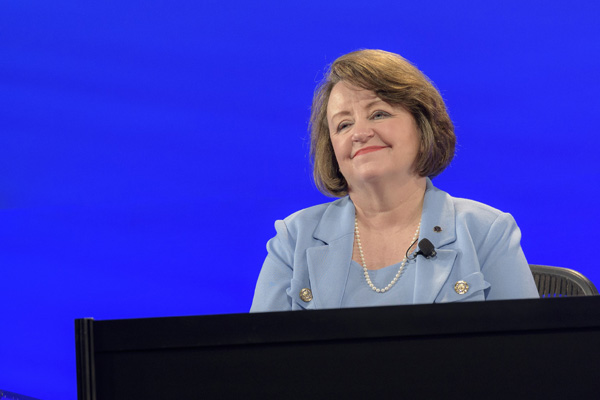
CHICAGO – Texas physicians and medical students began chalking up election victories early at the 2018 Annual Meeting of the American Medical Association (AMA) House of Delegates.
More elections loom for Tuesday, as do several days of debate on policy issues Texans brought to the Chicago meeting.
On Saturday afternoon, former Texas Medical Association President Sue Bailey, MD, of Fort Worth, was unopposed for election to her fourth term as speaker of the house. Delegates gave their leader a standing ovation as they accepted Dr. Bailey’s election by acclamation.
In other elections on the opening days of the meeting:
- John Flores, MD, an internist from Little Elm, was elected to the governing council of the AMA Organized Medical Staff Section;
- Houston emergency medicine physician Hilary Fairbrother, MD, who primarily practices at Memorial Hermann Hospital in the Texas Medical Center, won her race for chair-elect of the AMA Young Physician Section and will ascend to the chair in June 2019;
- Emily Dewar of the McGovern Medical School at the University of Texas Health Science Center at Houston was elected speaker of the AMA Medical Student Section;
- Aaron Wolbrueck from the University of North Texas Health Science Center at Fort Worth Texas College of Osteopathic Medicine was elected chair of Region 3 of the AMA Medical Student Section; and
- Texas A&M Health Science Center College of Medicine student Rebecca Haines won her race for Region 3 secretary/treasurer.
Two Texas physicians with long histories of service in the AMA face election challenges on Tuesday.
Russ Kridel, MD, of Houston, is seeking a second term on the AMA Board of Trustees.
“I can assure you that no medicine — be it Tums, Pepto-Bismol, or even that little Purple Pill — can extinguish the fire in the belly I carry for serving you, and for improving the health of our patients,” Dr. Kridel told the voting delegates in his announcement speech on Saturday.
Dr. Kridel and Asa Lockhart, MD, of Tyler, have been making the rounds at the meeting, campaigning before various state and specialty society delegations. Dr. Lockhart is running for re-election to the AMA Council on Medical Service.
Also Sunday night, the Texas Delegation held its annual chili tasting reception in honor of the candidates.
Policy debates come next
Meanwhile, Texans also worked to advance the two policy proposals they brought to Chicago at the direction of the TMA House of Delegates, which met last month in San Antonio:
- A resolution asking AMA to support allowing psychiatrists to e-prescribe medications when a telemedicine relationship has been established moved forward with only a minor amendment. Dallas psychiatrist Les Secrest, MD, explained to delegates that this approach will help medicine address the national opioid epidemic.
- A second resolution asks AMA to push Medicare to improve access to complex rehabilitation technology for patients with chronic and disabling conditions. North Richland Hills family physician Greg Fuller, MD, presented the proposal on Sunday to a house committee, which has recommended the issue for more in-depth AMA study.
Both resolutions will come before the full AMA House of Delegates again in the coming days.
Meanwhile, quick house action Sunday on a resolution cosponsored by the Missouri and Texas delegations gave an extra 10 years of life to AMA’s existing “prudent layperson” policy on health insurance companies’ payment for emergency medical services. The initiative grew out of plans by Blue Cross and Blue Shield of Texas, Anthem, and other insurers to force patients to pay the full cost of emergency department visits for certain non-life-threatening conditions.
The law in Texas and many other states defines “emergency care” with a “prudent layperson standard,” which shields patients from having to self-diagnose medical emergencies. Rather than reexamine the issue at this meeting, the house voted to reaffirm existing AMA policy on access to emergency services and on out-of-network care. That action means those policies will not automatically expire until 2028.
The House of Delegates meeting runs through Wednesday.